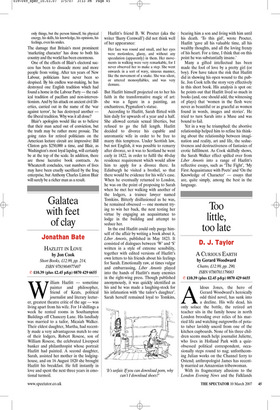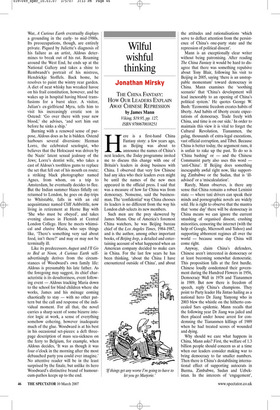Too little, too late
D. J. Taylor
A CURIOUS EARTH by Gerard Woodward Chatto, £12.99, pp. 290, ISBN 9780701179083 ✆ £10.39 (plus £2.45 p&p) 0870 429 6655 Aldous Jones, the hero of Gerard Woodward’s heroically odd third novel, has sunk into a decline. His wife dead, his only solace the bottle, the retired art teacher sits in the family house in north London brooding over relics of his married life and watching outgrowths of potato tuber lavishly uncoil from one of the kitchen cupboards. None of his three children seems much help: journalist Juliette, who lives in Holland Park with a quizobsessed political correspondent, occasionally steps round to nag; unforthcoming Julian works on the Channel ferry to Ostend; anthropologist James has recently married an Amazonian tribeswoman.
With its fragmentary allusions to the London Evening News and the Falklands War, A Curious Earth eventually displays a grounding in the earlyto mid-1980s. Its preoccupations, though, are entirely private. Piqued by Juliette’s diagnosis of his failure as an artist, Aldous determines to break out of his rut. Roaming around the West End, he ends up at the National Gallery and takes a shine to Rembrandt’s portrait of his mistress, Hendrickje Stoffels. Back home, he resolves to paint the wintry rear garden. A diet of neat whisky has wreaked havoc on his frail constitution, however, and he wakes up in hospital having blood transfusions for a burst ulcer. A visitor, Julian’s ex-girlfriend Myra, tells him to visit his increasingly erratic son in Ostend: ‘Go over there with your new blood,’ she advises, ‘and sort him out before he sinks a ship.’ Burning with a renewed sense of purpose, Aldous does as he is bidden. Ostend harbours several diversions: Herman Lorre, the celebrated sexologist, who believes that the Holocaust was driven by the Nazis’ latent sexual jealousy of the Jews; Lorre’s dentist wife, who takes a cast of Aldous’s toothless gums to replace the set that fell out of his mouth en route; a striking black photographer named Agnes, from whom, on a trip to Amsterdam, he eventually decides to flee. But the Indian summer blazes fitfully on: returned to London, he goes on day-trips to Whitstable, falls in with an old acquaintance named Cliff Ashbrittle, now living in retirement at Herne Bay with ‘She who must be obeyed’, and takes evening classes in Flemish at Central London College. Here he meets whimsical and elusive Maria, who says things like, ‘There’s something very sad about food, isn’t there?’ and may or may not be terminally ill.
Like its predecessors August and I’ll Go to Bed at Noon, A Curious Earth selfadvertisingly derives from the circumstances of Woodward’s own family life: Aldous is presumably his late father. As the foregoing may suggest, its chief characteristic is its desultoriness, event following event — Aldous tracking Maria down to the school for blind children where she works, James and his ménage coming chaotically to stay — with no other pattern but the call and response of the individual moment. For all that, the novel carries a sharp scent of some bizarre interior logic at work, a sense of everything somehow cohering, however inadequate much of the glue. Woodward is at his best in his occasional set-pieces: a deft threepage description of mass sea-sickness on the ferry to Belgium, for example, when Aldous decides, ‘It was as though it was four o’clock in the morning after the most debauched party you could ever imagine.’ No attentive reader will be in the least surprised by the finale, but unlike its hero Woodward’s distinctive brand of humourcum-pathos keeps up to the end.



























































































 Previous page
Previous page